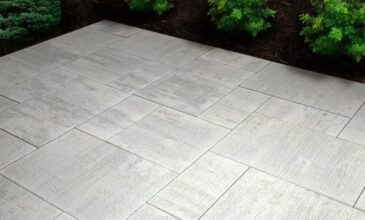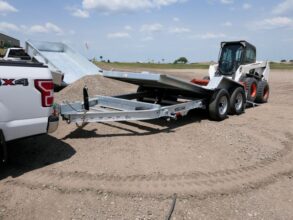The Fleet Management Solution
By Jessica Simpson
All landscape contractors need to understand the basics of fleet management. Keeping a fleet in top condition during peak months requires daily servicing, parts maintenance, refueling and, perhaps most important, time. But beyond these fundamental criteria, a bigger question looms after equipment has run its course on the fleet team: what is the best way to get rid of old equipment? There are several possible actions a contractor can take, but participating in a fleet management program is the only choice that solves all aspects of fleet management.
Problems with old equipment
According to Bill Engler, director of sales for Gravely, one of the pains in the industry for landscape contractors is dealing with the old equipment. “Landscapers typically choose from a number of options to dispose of older equipment,” said Engler. “They either sell it to employees or friends of the company, post the equipment on sites such as eBay or Craigslist, or simply put a “for sale” sign on it and sell it to anyone who drives by and inquires about it.”
Contractors who take the route of selling it themselves run a few risks, which can lead to headaches. If a friend buys a mower and then it breaks down, they might expect the contractor to repair it. And selling it to someone who walks in and asks requires time and haggling. Additionally, if landscapers choose to sell online, they have to take photos, negotiate pricing and continually follow-up throughout the process.
Another option landscape contractors have is to work directly with their servicing dealer on trade-ins or on a consignment basis, yet often dealers aren’t willing to pay the price a contractor asks for the piece of equipment. All of a sudden, selling a piece of used equipment becomes a burdensome process stealing valuable time and resources from contractors who simply want to maximize their equipment’s value. These extra expenses are often not recouped by their company.
Although the equipment is outdated and has run its course in a contractor’s fleet, it doesn’t mean the equipment is nonfunctioning or worthless. “Typically, if contractors properly maintain their equipment, it will deliver the highest residual value during resale,” said Engler. “Unfortunately, there is no sure way to guarantee when the greatest residual value will be — only the market demand at that point in time will be the determining factor. A good rule of thumb is that a unit between two and three years old with approximately 1,500 hours or less of use seems to bring the highest residual value in the used market.”
When it’s time to sell their used equipment, contractors who don’t participate in a fleet program tend to make mistakes when trying to gauge when it’s the right time. If they wait too long, they often become embroiled in a costly battle of repairing the declining equipment.
Tony Lapidus, a Gravely commercial products sales specialist, works with some of the largest landscape contractors in the Midwest. Lapidus witnesses firsthand the mistakes contractors make in monitoring their fleets. “Many contractors lose track of when certain machines were serviced, or they forget during their busy season and neglect the machines,” said Lapidus. “Gravely’s fleet program monitors their fleet for them, so they’re better able to serve their customers with high-performing equipment.”
A company can become inundated with failing parts as key components begin to wear and become unreliable. When one of these parts goes bad, the only option is to bite the bullet and repair it — often at a high price. In this scenario, the landscape contractor is hurting from many angles: they’re financially burdened with fixing the machines, they are tasked with completing their work with a diminished fleet, and they often have to sell the used equipment at a diminished value before they can purchase replacement mowers.
If the contractor had been participating in a fleet management program, the equipment would have been long-gone before major problems cropped up, said Lapidus. For example, Gravely works out a schedule for rotating older mowers out before major repairs are needed. Lapidus pointed out that if equipment covered by a fleet program needs repairs during the two- or three-year warranty period, Manufacturers provide a loaner piece while the other is being serviced. In crucial times, like spring, this makes all the difference in staying on schedule.
Pros of fleet management programs
Fleet programs are becoming more prevalent, with many manufacturers offering incentives to businesses that invest in a fleet from that manufacturer.
“Instead of playing the ‘How much is it worth?’ guessing game before deciding to sell their used equipment, landscape contractors should consider joining a fleet program,” said Engler. Fleet management programs are a win-win for the professional landscape contractor, dealer and manufacturer. The professional contractor maximizes their investment when they dispose of the equipment at the right time, while the dealer alleviates the pain of equipment disposal and makes money on the equipment sales. In turn, the manufacturer maximizes their brand exposure by having more equipment — both new and used — in the field.
Although dealers inherit the risk of selling the used equipment, they are much better positioned to do so. “If a dealer works closely with their customers, they have the ability to arrange buyers prior to acquiring equipment from the original user,” said Engler. “In some cases, they make a higher profit selling used, over new, mowers.”
Additionally, there isn’t a Blue Book value or an easy way to figure out the fair market value of landscape equipment like there is with automobiles, and markets vary tremendously. One market may be starving for walk-behinds while others are flooded, ultimately affecting the value of the machine.
“Since Gravely has a factory-direct sales team, we work closely with our customers and can tap into our extensive national dealer base to find out what areas of the country have the best opportunity to sell used equipment,” Engler explained.
Besides maximizing the value of the used equipment, fleet programs provide multiple other benefits.
”Rotating equipment out on a regular basis can enhance a landscape company’s image, and it allows the crew to have the latest advancements in technology,” said Engler. “This leads to better employee morale and productivity. Also because government policies on equipment change on a regular basis, the contractor is assured to have up-to-date safety and emissions features.”
All photos provided by Gravely
Owning equipment from one manufacturer gives the entire landscape crew and maintenance team the advantage of needing knowledge about only one brand, as well. Supporting multiple brands can lead to hidden costs and inefficiencies, because employees need to know how to run each mower and parts for each brand need to be stocked. With one uniform fleet, the landscape company can maximize the knowledge of their crew members and spend fewer man hours on maintenance and repair. To top all of it off, landscapers have the ultimate advantage of leveraging relationships with their service dealer and manufacturer, because everyone’s goals are in sync.
Streamlined budget management is another benefit to fleet programs. By utilizing a dealer-supported retail finance program, a contractor’s budget can be planned very effectively, which decreases the financial burden of unexpected costs. Another positive is that companies don’t have to shell out thousands of dollars at one time to replace their equipment. Instead it’s distributed monthly with low interest rates freeing up vital cash for daily business operations.
The final verdict
Ultimately, fleet programs simplify all aspects of buying, servicing and maintaining a fleet. Contractors gain in-depth knowledge of only one manufacturer, including how the manufacturer handles service, shipping parts and stocking parts. And they build trusted relationships.
In the end, the manufacturers, dealers and contractors all thrive and receive the end results they’re looking for. Fleet programs create a smooth, worry-free cycle of purchasing, servicing and disposing of used equipment.
Jessica Simpson is a public relations writer with Swanson Russell, Lincoln, Neb., working primarily with clients in the green and construction industries.


